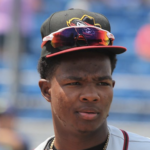
Part of being a good contributor for a site like Prospects1500 is being on social media and engaging with baseball fans on a regular basis. One of the things I encounter more than anything else on baseball Twitter is what I like to call the “Perpetually Unhappy Diehard.” This is the fan that spends the entire season lamenting the misadventures of a flailing team and the entire offseason calling for free agent signings or trades that are either unlikely to happen or unlikely to make that team a contender. When I read their posts I always have the same thought: “You need to join a dynasty league.” Now, I realize fantasy baseball isn’t for everyone, but if you’re spending that much time analyzing your real life team and their moves you have the time and interest it takes to run a team of your own. It can be both rewarding and a stress reliever to work on your own team instead of stressing about what a group of executives you’ve never met are going to do with a billionaire’s money. In this article I’ll talk about four distinct things that dynasty leagues have done for me as a baseball fan.
First though, let’s define what I mean by dynasty league. I’m not talking about an office league where you draft a whole new team every season. I’m also not talking about a keeper league where you get to keep a few players from last year’s team but you’re mostly drafting a new team each year. Those formats have their place and are great for the game, but they’re not what I’m focused on here. I’m talking about a league where you draft one time at the start of the league and from there you build and craft your team in competition with the other GMs over an indefinite period of time. There are no mulligans in a dynasty league. Your decisions as the GM will affect the direction of your team just like the real life GM of your favorite team does. There are dozens, perhaps hundreds, of different types of dynasty leagues, but they all share the basic premise of relying on the skill of the GM to improve the team from year to year.
Dynasty Baseball broadened my knowledge of the game and helped me understand what it takes to run a baseball club.
Building my dynasty teams is how I connect with the great players throughout the league that don’t play for my favorite teams or who I don’t see regularly by following my favorite teams. When I started playing dynasty baseball I was extremely reliant on statistical sites like Rotoworld to learn about players quickly because my knowledge was limited to the superstars of the game and the players on my local team. As I was forced to acquire free agent players and respond to trade requests in my dynasty league, my knowledge of players exploded and that increased my enjoyment of the game. I also learned to appreciate the nuances of the game like the different roles that relief pitchers play in the game and how platoon players can have a positive effect on a lineup.
Even more importantly than increasing my knowledge of players, running a dynasty team helped me understand all of the factors that go into fielding a competitive team over time. That trade that looks great on paper and might make me a contender this year can have a negative long term effect on my team. Signing a player to a five year contract when he only has three good years left can make years 4 and 5 harder for me, so how do I spot a declining player? What are the warning signs? These concepts are true in dynasty leagues and they’re true in real life. When you spend your time and effort to keep your dynasty team competitive year over year you begin to understand better the thinking of the GM of your favorite team. It also helps you understand just how hard it is to win a league and what a winning team looks like. I find that I have a much more narrow view of which MLB teams are truly contenders after trying to win a 30 team dynasty league myself. It makes it easier for me to go into a season with a realistic expectation of what my favorite teams can accomplish and what success looks like.
Dynasty Baseball made prospects a real part of my baseball universe.
You can’t build a successful dynasty team without understanding prospects and how future stars are identified and developed. Whether you choose to hold on to prospects and allow them to flourish into your regular lineup or you use them as trade bait to keep your roster stocked with productive veterans, they simply cannot be ignored. With the wealth of great resources online, becoming immersed in the future of the game is both accessible and engaging.
When you invest in a prospect for your dynasty team you become familiar with the many factors that play into that prospect’s road to MLB. When you’ve felt the frustration of watching an MLB club take playing time from a future star and give it to a middling veteran or seen a promising prospect forced into a position switch because he’s stuck in the wrong system it changes your perspective on how MLB teams are constructed. You’ll often see me use the phrase “play the kids!” on Twitter. That’s because dynasty baseball has opened my eyes to the possibilities beyond just free agency and trades. The next future star of your favorite team needs MLB at bats or innings to reach that potential. Sometimes cheering for that big trade or free agent signing is more self-defeating than you know. If you’ve got the next Mookie or Tatis in the system, the last thing you need is the team to sign some journeyman or worse to trade them away for a one year rental.
Dynasty Baseball gave me another way to enjoy the game when my favorite teams are flailing.
While I do make the case in this article that you can gain a better appreciation for the work of your favorite team’s GM by playing dynasty baseball, that’s not to say that those GMs are without fault. Indeed, a number of MLB GMs will look even more clueless once you’re running your own team. There will be times for many of us that our favorite team is either in full rebuild mode or worse stuck in a state of faux competitiveness with no real shot at the World Series. Running a dynasty team has given me an outlet to enjoy the game regardless of which teams are winning games in MLB. That doesn’t mean I don’t follow an MLB team or I don’t care if they do well. I do. But now, there are no wasted seasons. There are no seasons where I just don’t watch games. If my teams are too hard to watch I can look at my dynasty lineup and say “Oh, Tarik Skubal is making his first start today. I think I’ll watch the Tigers game.” I love baseball too much to let any club ruin my joy and dynasty baseball provides structure to that purpose.
Dynasty Baseball has broadened my baseball circle.
Chances are, you don’t know more than 1 or 2 people in real life that are into baseball enough to play in a serious dynasty league. Most dynasty leagues consist of like-minded baseball nerds (I wear that badge with pride), who met each other online in search of a good dynasty league. My experience is that, while there are good and bad experiences to be had in that impersonal setting, there are some amazing friendships to be had. In the dynasty leagues that I run we use Slack to communicate with one another and the baseball discussions that come out of those groups are exceptional. If there’s a big baseball game (and in some cases in other sports) going on, you can bet there will be at least a handful of us online watching the game together and breaking it down in real time. I consider a number of my fellow GMs to be true friends even if we’ve never met in person. It was through one of those friendships that I found myself with the opportunity to write for this great website. The common experience and love of baseball can bring us together. For that reason alone, dynasty baseball is a positive force in my life.
Dynasty baseball isn’t for every baseball fan, but I’d bet good money it’s for you. If you love baseball enough to read this whole article, I like my odds.
I’m always up for some good banter and I’d love to talk about this article or any baseball topic with you. You can find me on Twitter: @ChappyisClutch





Leave a Reply